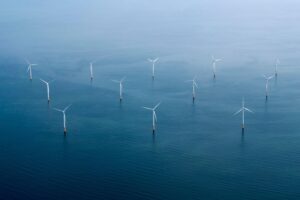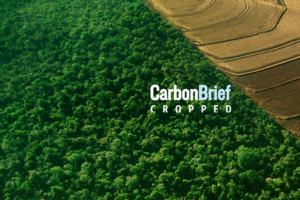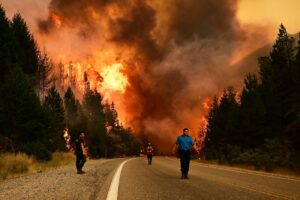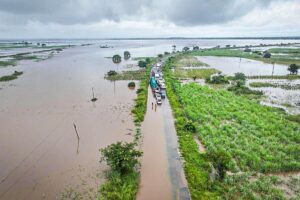Only around a third of the latest country climate pledges submitted to the UN express support for the “transition away from fossil fuels”, according to Carbon Brief analysis.
Several countries even have used their 2035 climate plans to commit to increasing the production or use of fossil fuels, predominately gas, the analysis finds.
The first global stocktake of progress to tackle climate change, agreed at the COP28 climate summit in Dubai in 2023, calls on all countries to contribute to “transitioning away from fossil fuels”.
Countries were meant to explain how they are implementing the outcomes of the global stocktake, including their contribution to transitioning away from fossil fuels, in their latest climate plans.
However, just 23 of the 63 plans submitted to the UN so far express support for “transitioning away from fossil fuels”, or the “phase out” or “phase down” of their use.
In addition, six countries, including Russia, Nigeria and Morocco, use their climate plans to commit to boosting gas production.
Some two-thirds of countries have not yet announced or submitted their pledges, missing not only the UN deadline of 10 February, but also an extension to September.
How to address the lack of sufficient action from countries with their latest plans is billed to be one of the major issues up for debate at the COP30 climate summit in Brazil next month.
Taking stock
In 2015, countries forged the Paris Agreement, the landmark deal to keep temperature rise “well-below” 2C, with “aspirations” to limit global warming to 1.5C of warming by the end of this century.
At the time, countries’ initial pledges were not enough to put the world on track to meet the temperature targets, so they built a “ratchet mechanism” into the Paris Agreement, requiring them to keep increasing their ambition in the following years.
As part of this, countries agreed to submit new, more ambitious plans every five years detailing what they are doing to take action on climate change and adapt to its impacts. These are called “nationally determined contributions” (NDCs).
The Paris Agreement also stated that, following on from these plans, “global stocktakes” should be conducted to assess collective progress in meeting the temperature goal.
The first global stocktake concluded at the COP28 climate summit in Dubai in 2023, with countries agreeing to a new document setting out how they will respond to a lack of sufficient action to meet the Paris goals.
The two-week talks saw fierce debate about how fossil fuels – the main driver of human-caused climate change – should be referred to in this text.

In the end, the stocktake “calls on” all countries to “contribute to” a list of global goals, including “transitioning away from fossil fuels…accelerating action in this critical decade” towards net-zero by 2050.
It was the first time that countries formally acknowledged the need to transition away from fossil fuels in almost 30 years of international climate negotiations.
However, many countries were disappointed that the text did not contain a firmer commitment to phase out all fossil fuels, or even just those with “unabated” emissions.
After Dubai, countries were expected to come up with new NDCs for 2035 that explained how they responded to the priorities set out in the stocktake.
The deadline for submitting the “3.0” NDCs was 10 February 2025, which 95% of countries missed.
On 24 September, the UN convened a climate summit in New York at the sidelines of the UN general assembly in the hope of encouraging more countries to come forward with new NDCs.
China stole the show at the event, announcing a pledge – although not yet formally submitted to the UN – to cut greenhouse gas emissions to 7-10% below peak levels by 2035. Several other countries announced new plans, including Russia, Turkey and Bangladesh.
Following the summit, around one-third of countries have announced or submitted their 2035 NDCs.
Fossil-fuel focus
For the analysis, Carbon Brief reviewed each of the NDCs submitted to the UN to determine whether they express support for “transitioning away” from fossil fuels or for phasing them out or “down”.
Countries were considered to have expressed support if they explicitly mentioned the terms “transition” or “phase out/down” in relation to “fossil fuels” when speaking about their own actions to address climate change.
Some countries spoke in general terms about “reducing” or “replacing” fossil fuels, but did not explicitly reference the need to transition away from or phase them down or out. Others spoke about transitioning to a clean or renewable-based economy, but did not explicitly mention fossil fuels.
For the purposes of this analysis, all of these countries were considered to have not expressed support for the need to transition away from fossil fuels.
In addition, some countries mentioned in their NDCs that the global stocktake calls for a transition away from fossil fuels, but did not say that transitioning away from fossil fuels would be part of their own actions to address climate change.
These countries were also considered to have not expressed support for the need to transition away from fossil fuels.
Overall, the results show that only one-third of countries express support for the need to transition away from fossil fuels in their NDCs.
Countries used varying language when speaking about the need to transition away from fossil fuels.
Some directly acknowledged that transitioning away from fossil fuels was a key conclusion of the global stocktake and committed to doing this within their own borders.
This includes the UK, Brazil, Canada, Australia, Singapore, Lebanon and Niue. For example, the UK’s NDC states:
“At home and in line with the outcomes of the GST [global stocktake], the UK is committed to transitioning away from fossil fuels to achieve net-zero by 2050.”
Other countries chose to commit to “phasing out” fossil fuels instead of “transitioning away”.
This includes Iceland and Vanuatu. Similarly, Colombia’s NDC says:
“NDC 3.0 reaffirms that the phasing out of fossil fuels is not only a climate imperative, but also an opportunity to strengthen energy sovereignty [and] democratise the benefits of the transition.”
(Colombia and Vanuatu were two of the countries that were disappointed not to see a commitment to phase out fossil fuels included within the global stocktake text.)
Barbados, an island nation known for its strong commitment to climate action, committed in its NDC to “achieve a fossil fuel-free economy” by 2040. In addition, Chile pledged to contribute to the “elimination of fossil fuels”.
In the analysis, these pledges were considered to be support for transitioning away from fossil fuels, despite not using the terms “transition” or “phase out”.
The table below shows the language used by each of the 21 countries that expressed support for transitioning away from fossil fuels, according to the analysis.
| Country | Expression of support for ‘transitioning away from fossil fuels’ in NDC |
|---|---|
| United Kingdom | “At home and in line with the outcomes of the GST, the UK is committed to transitioning away from fossil fuels to achieve net-zero by 2050.” |
| Brazil | “Brazil will respond to the call to contribute to global efforts under paragraph 28 of decision 1/CMA.5, through the policies and national efforts below, including those under the National Climate Plan. In addition, Brazil would welcome the launching of international work for the definition of schedules for transitioning away from fossil fuels in energy systems, in a just, orderly and equitable manner, with developed countries taking the lead, on the basis of the best available science, reflecting equity and the principle of common but differentiated responsibilities and respective capabilities in the light of different national circumstances and in the context of sustainable development and efforts to eradicate poverty, as per paragraph 6 of decision 1/ CMA.5.” |
| Canada | “Canada also remains committed to implementing the mitigation outcomes of the Global Stocktake (GST), agreed at COP28…This includes…transitioning away from fossil fuels in energy systems.” |
| Lebanon | “Guided by the UAE Consensus reached at COP28, which calls on all Parties to transition away from fossil fuels and strengthen support for adaptation, this NDC reflects Lebanon’s commitment to scaling ambition while addressing national vulnerabilities.” |
| Iceland | “Iceland’s NDC takes note of the outcome of the global stocktake, according to Decision 1/CMA.5. Specifically, Iceland’s NDC seeks to represent the need for deep, rapid and sustained reductions in greenhouse gas emissions in line with 1.5°C pathways by contributing to the phase-out of fossil fuels across sectors and the strategic, fair and ambitious implementation of carbon capture, utilisation and storage, according to para. 28.” |
| Barbados | “In 2020, the Government of Barbados set the aspirational goal to achieve a fossil fuel-free economy and to reduce GHG emissions across all sectors to as close to zero as possible by 2030. In light of the significant challenges faced by the country, the aspirational goal is currently expected to be reached around 2040.” |
| Chile | “In 2023, within the framework of the 28th Conference of the Parties to the UNFCCC (COP) in Dubai, the report on the First Global Stocktake, designed within the framework of the Paris Agreement to assess the global response to the climate crisis, was presented…Among its main conclusions, the agreement to move towards the elimination of fossil fuels in energy systems…stands out. All these conclusions are addressed in this NDC, demonstrating Chile’s commitment to climate ambition.” |
| Vanuatu | “Moving beyond our current net-zero status, this NDC recommits Vanuatu to rapidly phasing out fossil fuels, deeply decarbonising and transitioning completely to a circular economy.” |
| Pakistan | “Natural gas and furnace oil are set to decline, with net reductions of 2,147 MW and 430 MW respectively, as per IGCEP 2025-2035, signaling a gradual phase down of fossil fuels in Pakistan’s capacity mix.” |
| Colombia | “NDC 3.0 reaffirms that the phasing out of fossil fuels is not only a climate imperative, but also an opportunity to strengthen energy sovereignty, democratize the benefits of the transition, and consolidate Colombia as a Power of Life.” |
| Niue | Niue understands the need to transition from fossil fuel-based electricity generation to renewable energy to reduce the GHG emissions footprint and ensure energy security.” |
| Singapore | “Singapore is contributing to the first global stocktake’s call to triple global renewable energy capacity and double the global average annual rate of energy efficiency improvements by 2030. We are also supporting efforts to transition away from fossil fuels in energy systems and phase out inefficient fossil fuel subsidies.” |
| Australia | “The global stocktake recognised the global direction of travel in its consensus call to transition away from fossil fuels in energy systems and to phase-down unabated coal-fired power. In Australia, our transition is underway.” |
| United Arab Emirates | “The GST Outcome at COP28, together with the broader UAE Consensus and the work under the Troika, has provided a strong impetus for the UAE NDC 3.0. The outcome of the first GST notably emphasizes the need to transition away from fossil fuels in energy systems in a just, orderly and equitable manner, urging parties to adopt ambitious, economy-wide emission reduction targets.” |
| Japan | “The items listed in decision 1/CMA.5 have been incorporated to the greatest extent possible into the Plan for Global Warming Countermeasures, which is a comprehensive implementation plan for achieving Japan’s NDC.” |
| Bolivia | “The persistent dependence on fossil fuels, both for electricity generation and transportation, not only contributes to national greenhouse gas emissions, but also exposes the country to volatility in international oil and gas prices, highlighting the urgency of a fair, sovereign, and resilient energy transition toward renewable sources.” |
| Nicaragua | “The transition to an energy matrix less dependent on fossil fuels is a fundamental priority of the government.” |
| Marshall Islands | “This NDC also demonstrates our drive, our achievements, and the challenges we face. In particular, we detail our domestic actions to contribute to the collective commitments made following the global stocktake, including the tripling of renewable energy, doubling of energy efficiency and removal of fossil fuel subsidies, all in pursuit of accelerating the transition away from fossil fuels this decade.” |
| Cambodia | “This transition will be implemented in two key phases: 70% renewable energy by 2030, followed by a further increase to 72% by 2035, ensuring a gradual yet decisive shift away from fossil fuel dependency in the power sector.” |
| Bangladesh | “Transitioning away from fossil fuels in energy systems, in a just, orderly and equitable manner [is] central to Bangladesh’s contribution to the global response to climate change. The NDC 3.0 commitments are designed not only to reduce Greenhouse Gas (GHG) emissions but also to accelerate the just energy transition, promote zero- and low-emission technologies, and enhance climate resilience.” |
| Tuvalu | “We are steadfast in our transition to 100% renewable energy.” |
| Sri Lanka | “With abundant solar, wind, and hydropower resources, Sri Lanka has a clear opportunity and expressed ambitious commitments to move towards total electricity generation based on renewable sources, to transition away from fossil fuels toward cleaner, decentralised energy systems.” |
| Nepal | Nepal’s NDC is “informed” by Decision 1/CMA.5 Outcome of the first GST, “such as 1.5C decarbonisation pathway…just transition away from fossil fuels in energy systems.” |
Source: Carbon Brief analysis of UN NDC registry
Separately, the thinktank E3G has examined how countries speak about their policies for reducing fossil fuels in their NDCs.
It found that more than two-thirds of countries include “explicit references to displacing fossil fuels in their electricity mix”.
However, E3G also noted that “specific language on winding down the production of coal, oil, and fossil gas is lacking in almost all NDCs”.
‘Transitional fuel’
Carbon Brief also examined each of the submitted NDCs to see how countries speak about new fossil-fuel production and use within their borders.
Six of the 64 nations – around 10% – used their NDCs to pledge to increase fossil-fuel production or use, predominately gas, claiming this could contribute to their efforts to lower emissions.
In its NDC, the world’s fourth biggest emitter, Russia, says it “emphasises the importance of implementing a just transition to low-emission development models using all available solutions”, including “gas as a transition fuel and technologies for reducing emissions in coal-fired power generation”.
During negotiations on the stocktake text in 2023, Russia had pushed successfully to include a controversial paragraph that says “transitional fuels can play a role in facilitating the energy transition while ensuring energy security”, Climate Home News reported.
The publication noted that, after this text was agreed, Antigua and Barbuda negotiator Diann Black-Layne called it a “dangerous loophole”, adding that gas is also a fossil fuel that “we need to transition away from”.
Several African nations, including Nigeria, Morocco, Mauritius and Zimbabwe, also pledged to boost the production or use of gas as part of their “climate” actions.
Nigeria, Africa’s second biggest emitter, says that the country “relies heavily on the oil and gas industry” and that the sector will be “called upon to further grow while adopting sustainability measures”. It continues:
“Natural gas use will be boosted, serving as a key transition fuel in Nigeria’s move towards increased adoption of renewable energy for meeting its net-zero emissions target.”
The world’s energy watchdog, the International Energy Agency, recently reemphasised that there would be no need for any new fossil-fuel production, if the world cuts emissions in line with limiting global warming to 1.5C.
It comes after the world’s top court this year concluded that new fossil-fuel production, consumption, the granting of exploration licences or the provision of subsidies “may constitute an internationally wrongful act”, leaving the states involved vulnerable to legal action.
COP30 calls
After nearly all nations missed the deadline for submitting NDCs in February, UN climate chief Simon Stiell asked laggard countries to do so by the end of September.
This will allow their plans to be included in a new report synthesising the level of progress contained within the latest NDCs, which is due to be published on 24 October. (Less than a third of nations met Stiell’s request.)
The report will come just before COP30, which will take place from 10-21 November in the rainforest Brazilian city of Belém.
Whether and how to respond to the insufficient progress contained within these NDCs, including whether to call for increased ambition in line with the outcomes of the first global stocktake, are among the key issues up for debate at the summit.
The Brazilian presidency is pushing for a formal COP decision on any “disappoint[ment]” over NDCs falling short, collectively, of what is needed to avoid dangerous global warming.
However, other countries would need to agree to this proposal at the summit.
The post Revealed: Only a third of national climate pledges support ‘transition away from fossil fuels’ appeared first on Carbon Brief.
Revealed: Only a third of national climate pledges support ‘transition away from fossil fuels’
Greenhouse Gases
Cropped 25 February 2026: Food inflation strikes | El Niño looms | Biodiversity talks stagnate
We handpick and explain the most important stories at the intersection of climate, land, food and nature over the past fortnight.
This is an online version of Carbon Brief’s fortnightly Cropped email newsletter.
Subscribe for free here.
Key developments
Food inflation on the rise
DELUGE STRIKES FOOD: Extreme rainfall and flooding across the Mediterranean and north Africa has “battered the winter growing regions that feed Europe…threatening food price rises”, reported the Financial Times. Western France has “endured more than 36 days of continuous rain”, while farmers’ associations in Spain’s Andalusia estimate that “20% of all production has been lost”, it added. Policy expert David Barmes told the paper that the “latest storms were part of a wider pattern of climate shocks feeding into food price inflation”.
-
Sign up to Carbon Brief’s free “Cropped” email newsletter. A fortnightly digest of food, land and nature news and views. Sent to your inbox every other Wednesday.
NO BEEF: The UK’s beef farmers, meanwhile, “face a double blow” from climate change as “relentless rain forces them to keep cows indoors”, while last summer’s drought hit hay supplies, said another Financial Times article. At the same time, indoor growers in south England described a 60% increase in electricity standing charges as a “ticking timebomb” that could “force them to raise their prices or stop production, which will further fuel food price inflation”, wrote the Guardian.
‘TINDERBOX’ AND TARIFFS: A study, covered by the Guardian, warned that major extreme weather and other “shocks” could “spark social unrest and even food riots in the UK”. Experts cited “chronic” vulnerabilities, including climate change, low incomes, poor farming policy and “fragile” supply chains that have made the UK’s food system a “tinderbox”. A New York Times explainer noted that while trade could once guard against food supply shocks, barriers such as tariffs and export controls – which are being “increasingly” used by politicians – “can shut off that safety valve”.
El Niño looms
NEW ENSO INDEX: Researchers have developed a new index for calculating El Niño, the large-scale climate pattern that influences global weather and causes “billions in damages by bringing floods to some regions and drought to others”, reported CNN. It added that climate change is making it more difficult for scientists to observe El Niño patterns by warming up the entire ocean. The outlet said that with the new metric, “scientists can now see it earlier and our long-range weather forecasts will be improved for it.”
WARMING WARNING: Meanwhile, the US Climate Prediction Center announced that there is a 60% chance of the current La Niña conditions shifting towards a neutral state over the next few months, with an El Niño likely to follow in late spring, according to Reuters. The Vibes, a Malaysian news outlet, quoted a climate scientist saying: “If the El Niño does materialise, it could possibly push 2026 or 2027 as the warmest year on record, replacing 2024.”
CROP IMPACTS: Reuters noted that neutral conditions lead to “more stable weather and potentially better crop yields”. However, the newswire added, an El Niño state would mean “worsening drought conditions and issues for the next growing season” to Australia. El Niño also “typically brings a poor south-west monsoon to India, including droughts”, reported the Hindu’s Business Line. A 2024 guest post for Carbon Brief explained that El Niño is linked to crop failure in south-eastern Africa and south-east Asia.
News and views
- DAM-AG-ES: Several South Korean farmers filed a lawsuit against the country’s state-owned utility company, “seek[ing] financial compensation for climate-related agricultural damages”, reported United Press International. Meanwhile, a national climate change assessment for the Philippines found that the country “lost up to $219bn in agricultural damages from typhoons, floods and droughts” over 2000-10, according to Eco-Business.
- SCORCHED GRASS: South Africa’s Western Cape province is experiencing “one of the worst droughts in living memory”, which is “scorching grass and killing livestock”, said Reuters. The newswire wrote: “In 2015, a drought almost dried up the taps in the city; farmers say this one has been even more brutal than a decade ago.”
- NOUVELLE VEG: New guidelines published under France’s national food, nutrition and climate strategy “urged” citizens to “limit” their meat consumption, reported Euronews. The delayed strategy comes a month after the US government “upended decades of recommendations by touting consumption of red meat and full-fat dairy”, it noted.
- COURTING DISASTER: India’s top green court accepted the findings of a committee that “found no flaws” in greenlighting the Great Nicobar project that “will lead to the felling of a million trees” and translocating corals, reported Mongabay. The court found “no good ground to interfere”, despite “threats to a globally unique biodiversity hotspot” and Indigenous tribes at risk of displacement by the project, wrote Frontline.
- FISH FALLING: A new study found that fish biomass is “falling by 7.2% from as little as 0.1C of warming per decade”, noted the Guardian. While experts also pointed to the role of overfishing in marine life loss, marine ecologist and study lead author Dr Shahar Chaikin told the outlet: “Our research proves exactly what that biological cost [of warming] looks like underwater.”
- TOO HOT FOR COFFEE: According to new analysis by Climate Central, countries where coffee beans are grown “are becoming too hot to cultivate them”, reported the Guardian. The world’s top five coffee-growing countries faced “57 additional days of coffee-harming heat” annually because of climate change, it added.
Spotlight
Nature talks inch forward
This week, Carbon Brief covers the latest round of negotiations under the UN Convention on Biological Diversity (CBD), which occurred in Rome over 16-19 February.
The penultimate set of biodiversity negotiations before October’s Conference of the Parties ended in Rome last week, leaving plenty of unfinished business.
The CBD’s subsidiary body on implementation (SBI) met in the Italian capital for four days to discuss a range of issues, including biodiversity finance and reviewing progress towards the nature targets agreed under the Kunming-Montreal Global Biodiversity Framework (GBF).
However, many of the major sticking points – particularly around finance – will have to wait until later this summer, leaving some observers worried about the capacity for delegates to get through a packed agenda at COP17.
The SBI, along with the subsidiary body on scientific, technical and technological advice (SBSTTA) will both meet in Nairobi, Kenya, later this summer for a final round of talks before COP17 kicks off in Yerevan, Armenia, on 19 October.
Money talks
Finance for nature has long been a sticking point at negotiations under the CBD.
Discussions on a new fund for biodiversity derailed biodiversity talks in Cali, Colombia, in autumn 2024, requiring resumed talks a few months later.
Despite this, finance was barely on the agenda at the SBI meetings in Rome. Delegates discussed three studies on the relationship between debt sustainability and implementation of nature plans, but the more substantive talks are set to take place at the next SBI meeting in Nairobi.
Several parties “highlighted concerns with the imbalance of work” on finance between these SBI talks and the next ones, reported Earth Negotiations Bulletin (ENB).
Lim Li Ching, senior researcher at Third World Network, noted that tensions around finance permeated every aspect of the talks. She told Carbon Brief:
“If you’re talking about the gender plan of action – if there’s little or no financial resources provided to actually put it into practice and implement it, then it’s [just] paper, right? Same with the reporting requirements and obligations.”
Monitoring and reporting
Closely linked to the issue of finance is the obligations of parties to report on their progress towards the goals and targets of the GBF.
Parties do so through the submission of national reports.
Several parties at the talks pointed to a lack of timely funding for driving delays in their reporting, according to ENB.
A note released by the CBD Secretariat in December said that no parties had submitted their national reports yet; by the time of the SBI meetings, only the EU had. It further noted that just 58 parties had submitted their national biodiversity plans, which were initially meant to be published by COP16, in October 2024.
Linda Krueger, director of biodiversity and infrastructure policy at the environmental not-for-profit Nature Conservancy, told Carbon Brief that despite the sparse submissions, parties are “very focused on the national report preparation”. She added:
“Everybody wants to be able to show that we’re on the path and that there still is a pathway to getting to 2030 that’s positive and largely in the right direction.”
Watch, read, listen
NET LOSS: Nigeria’s marine life is being “threatened” by “ghost gear” – nets and other fishing equipment discarded in the ocean – said Dialogue Earth.
COMEBACK CAUSALITY: A Vox long-read looked at whether Costa Rica’s “payments for ecosystem services” programme helped the country turn a corner on deforestation.
HOMEGROWN GOALS: A Straits Times podcast discussed whether import-dependent Singapore can afford to shelve its goal to produce 30% of its food locally by 2030.
‘RUSTING’ RIVERS: The Financial Times took a closer look at a “strange new force blighting the [Arctic] landscape”: rivers turning rust-orange due to global warming.
New science
- Lakes in the Congo Basin’s peatlands are releasing carbon that is thousands of years old | Nature Geoscience
- Natural non-forest ecosystems – such as grasslands and marshlands – were converted for agriculture at four times the rate of land with tree cover between 2005 and 2020 | Proceedings of the National Academy of Sciences
- Around one-quarter of global tree-cover loss over 2001-22 was driven by cropland expansion, pastures and forest plantations for commodity production | Nature Food
In the diary
- 2-6 March: UN Food and Agriculture Organization regional conference for Latin America and Caribbean | Brasília
- 5 March: Nepal general elections
- 9-20 March: First part of the thirty-first session of the International Seabed Authority (ISA) | Kingston, Jamaica
Cropped is researched and written by Dr Giuliana Viglione, Aruna Chandrasekhar, Daisy Dunne, Orla Dwyer and Yanine Quiroz.
Please send tips and feedback to cropped@carbonbrief.org
The post Cropped 25 February 2026: Food inflation strikes | El Niño looms | Biodiversity talks stagnate appeared first on Carbon Brief.
Cropped 25 February 2026: Food inflation strikes | El Niño looms | Biodiversity talks stagnate
Greenhouse Gases
Dangerous heat for Tour de France riders only a ‘question of time’
Rising temperatures across France since the mid-1970s is putting Tour de France competitors at “high risk”, according to new research.
The study, published in Scientific Reports, uses 50 years of climate data to calculate the potential heat stress that athletes have been exposed to across a dozen different locations during the world-famous cycling race.
The researchers find that both the severity and frequency of high-heat-stress events have increased across France over recent decades.
But, despite record-setting heatwaves in France, the heat-stress threshold for safe competition has rarely been breached in any particular city on the day the Tour passed through.
(This threshold was set out by cycling’s international governing body in 2024.)
However, the researchers add it is “only a question of time” until this occurs as average temperatures in France continue to rise.
The lead author of the study tells Carbon Brief that, while the race organisers have been fortunate to avoid major heat stress on race days so far, it will be “harder and harder to be lucky” as extreme heat becomes more common.
‘Iconic’
The Tour de France is one of the world’s most storied cycling races and the oldest of Europe’s three major multi-week cycling competitions, or Grand Tours.
Riders cover around 3,500 kilometres (km) of distance and gain up to nearly 55km of altitude over 21 stages, with only two or three rest days throughout the gruelling race.
The researchers selected the Tour de France because it is the “iconic bike race. It is the bike race of bike races,” says Dr Ivana Cvijanovic, a climate scientist at the French National Research Institute for Sustainable Development, who led the new work.
Heat has become a growing problem for the competition in recent years.
In 2022, Alexis Vuillermoz, a French competitor, collapsed at the finish line of the Tour’s ninth stage, leaving in an ambulance and subsequently pulling out of the race entirely.
Two years later, British cyclist Sir Mark Cavendish vomited on his bike during the first stage of the race after struggling with the 36C heat.
The Tour also makes a good case study because it is almost entirely held during the month of July and, while the route itself changes, there are many cities and stages that are repeated from year to year, Cvijanovic adds.
‘Have to be lucky’
The study focuses on the 50-year span between 1974 and 2023.
The researchers select six locations across the country that have commonly hosted the Tour, from the mountain pass of Col du Tourmalet, in the French Pyrenees, to the city of Paris – where the race finishes, along the Champs-Élysées.
These sites represent a broad range of climatic zones: Alpe d’ Huez, Bourdeaux, Col du Tourmalet, Nîmes, Paris and Toulouse.
For each location, they use meteorological reanalysis data from ERA5 and radiant temperature data from ERA5-HEAT to calculate the “wet-bulb globe temperature” (WBGT) for multiple times of day across the month of July each year.
WBGT is a heat-stress index that takes into account temperature, humidity, wind speed and direct sunlight.
Although there is “no exact scientific consensus” on the best heat-stress index to use, WBGT is “one of the rare indicators that has been originally developed based on the actual human response to heat”, Cvijanovic explains.
It is also the one that the International Cycling Union (UCI) – the world governing body for sport cycling – uses to assess risk. A WBGT of 28C or higher is classified as “high risk” by the group.
WBGT is the “gold standard” for assessing heat stress, says Dr Jessica Murfree, director of the ACCESS Research Laboratory and assistant professor at the University of North Carolina at Chapel Hill.
Murfree, who was not involved in the new study, adds that the researchers are “doing the right things by conducting their science in alignment with the business practices that are already happening”.
The researchers find that across the 50-year time period, WBGT has been increasing across the entire country – albeit, at different rates. In the north-west of the country, WBGT has increased at an average rate of 0.1C per decade, while in the southern and eastern parts of the country, it has increased by more than 0.5C per decade.
The maps below show the maximum July WBGT for each decade of the analysis (rows) and for hourly increments of the late afternoon (columns). Lower temperatures are shown in lighter greens and yellows, while higher temperatures are shown in darker reds and purples.
Six Tour de France locations analysed in the study are shown as triangles on the maps (clockwise from top): Paris, Alpe d’ Huez, Nîmes, Toulouse, Col du Tourmalet and Bordeaux.
The maps show that the maximum WBGT temperature in the afternoon has surpassed 28C over almost the entire country in the last decade. The notable exceptions to this are the mountainous regions of the Alps and the Pyrenees.
The researchers also find that most of the country has crossed the 28C WBGT threshold – which they describe as “dangerous heat levels” – on at least one July day over the past decade. However, by looking at the WBGT on the day the Tour passed through any of these six locations, they find that the threshold has rarely been breached during the race itself.
For example, the research notes that, since 1974, Paris has seen a WBGT of 28C five times at 3pm in July – but that these events have “so far” not coincided with the cycling race.
The study states that it is “fortunate” that the Tour has so far avoided the worst of the heat-stress.
Cvijanovic says the organisers and competitors have been “lucky” to date. She adds:
“It has worked really well for them so far. But as the frequency of these [extreme heat] events is increasing, it will be harder and harder to be lucky.”
Dr Madeleine Orr, an assistant professor of sport ecology at the University of Toronto who was not involved in the study, tells Carbon Brief that the paper was “really well done”, noting that its “methods are good [and its] approach was sound”. She adds:
“[The Tour has] had athletes complain about [the heat]. They’ve had athletes collapse – and still those aren’t the worst conditions. I think that that says a lot about what we consider safe. They’ve still been lucky to not see what unsafe looks like, despite [the heat] having already had impacts.”
Heat safety protocols
In 2024, the UCI set out its first-ever high temperature protocol – a set of guidelines for race organisers to assess athletes’ risk of heat stress.
The assessment places the potential risk into one of five categories based on the WBGT, ranging from very low to high risk.
The protocol then sets out suggested actions to take in the event of extreme heat, ranging from having athletes complete their warm-ups using ice vests and cold towels to increasing the number of support vehicles providing water and ice.
If the WBGT climbs above the 28C mark, the protocol suggests that organisers modify the start time of the stage, adapt the course to remove particularly hazardous sections – or even cancel the race entirely.
However, Orr notes that many other parts of the race, such as spectator comfort and equipment functioning, may have lower temperatures thresholds that are not accounted for in the protocol, but should also be considered.
Murfree points out that the study’s findings – and the heat protocol itself – are “really focused on adaptation, rather than mitigation”. While this is “to be expected”, she tells Carbon Brief:
“Moving to earlier start times or adjusting the route specifically to avoid these locations that score higher in heat stress doesn’t stop the heat stress. These aren’t climate preventative measures. That, I think, would be a much more difficult conversation to have in the research because of the Tour de France’s intimate relationship with fossil-fuel companies.”
The post Dangerous heat for Tour de France riders only a ‘question of time’ appeared first on Carbon Brief.
Dangerous heat for Tour de France riders only a ‘question of time’
Greenhouse Gases
DeBriefed 20 February 2026: EU’s ‘3C’ warning | Endangerment repeal’s impact on US emissions | ‘Tree invasion’ fuelled South America’s fires
Welcome to Carbon Brief’s DeBriefed.
An essential guide to the week’s key developments relating to climate change.
This week
Preparing for 3C
NEW ALERT: The EU’s climate advisory board urged countries to prepare for 3C of global warming, reported the Guardian. The outlet quoted Maarten van Aalst, a member of the advisory board, saying that adapting to this future is a “daunting task, but, at the same time, quite a doable task”. The board recommended the creation of “climate risk assessments and investments in protective measures”.
‘INSUFFICIENT’ ACTION: EFE Verde added that the advisory board said that the EU’s adaptation efforts were so far “insufficient, fragmented and reactive” and “belated”. Climate impacts are expected to weaken the bloc’s productivity, put pressure on public budgets and increase security risks, it added.
UNDERWATER: Meanwhile, France faced “unprecedented” flooding this week, reported Le Monde. The flooding has inundated houses, streets and fields and forced the evacuation of around 2,000 people, according to the outlet. The Guardian quoted Monique Barbut, minister for the ecological transition, saying: “People who follow climate issues have been warning us for a long time that events like this will happen more often…In fact, tomorrow has arrived.”
IEA ‘erases’ climate
MISSING PRIORITY: The US has “succeeded” in removing climate change from the main priorities of the International Energy Agency (IEA) during a “tense ministerial meeting” in Paris, reported Politico. It noted that climate change is not listed among the agency’s priorities in the “chair’s summary” released at the end of the two-day summit.
US INTERVENTION: Bloomberg said the meeting marked the first time in nine years the IEA failed to release a communique setting out a unified position on issues – opting instead for the chair’s summary. This came after US energy secretary Chris Wright gave the organisation a one-year deadline to “scrap its support of goals to reduce energy emissions to net-zero” – or risk losing the US as a member, according to Reuters.
Around the world
- ISLAND OBJECTION: The US is pressuring Vanuatu to withdraw a draft resolution supporting an International Court of Justice ruling on climate change, according to Al Jazeera.
- GREENLAND HEAT: The Associated Press reported that Greenland’s capital Nuuk had its hottest January since records began 109 years ago.
- CHINA PRIORITIES: China’s Energy Administration set out its five energy priorities for 2026-2030, including developing a renewable energy plan, said International Energy Net.
- AMAZON REPRIEVE: Deforestation in the Brazilian Amazon has continued to fall into early 2026, extending a downward trend, according to the latest satellite data covered by Mongabay.
- GEZANI DESTRUCTION: Reuters reported the aftermath of the Gezani cyclone, which ripped through Madagascar last week, leaving 59 dead and more than 16,000 displaced people.
20cm
The average rise in global sea levels since 1901, according to a Carbon Brief guest post on the challenges in projecting future rises.
Latest climate research
- Wildfire smoke poses negative impacts on organisms and ecosystems, such as health impacts on air-breathing animals, changes in forests’ carbon storage and coral mortality | Global Ecology and Conservation
- As climate change warms Antarctica throughout the century, the Weddell Sea could see the growth of species such as krill and fish and remain habitable for Emperor penguins | Nature Climate Change
- About 97% of South American lakes have recorded “significant warming” over the past four decades and are expected to experience rising temperatures and more frequent heatwaves | Climatic Change
(For more, see Carbon Brief’s in-depth daily summaries of the top climate news stories on Monday, Tuesday, Wednesday, Thursday and Friday.)
Captured

Repealing the US’s landmark “endangerment finding”, along with actions that rely on that finding, will slow the pace of US emissions cuts, according to Rhodium Group visualised by Carbon Brief. US president Donald Trump last week formally repealed the scientific finding that underpins federal regulations on greenhouse gas emissions, although the move is likely to face legal challenges. Data from the Rhodium Group, an independent research firm, shows that US emissions will drop more slowly without climate regulations. However, even with climate regulations, emissions are expected to drop much slower under Trump than under the previous Joe Biden administration, according to the analysis.
Spotlight
How a ‘tree invasion’ helped to fuel South America’s fires
This week, Carbon Brief explores how the “invasion” of non-native tree species helped to fan the flames of forest fires in Argentina and Chile earlier this year.
Since early January, Chile and Argentina have faced large-scale and deadly wildfires, including in Patagonia, which spans both countries.
These fires have been described as “some of the most significant and damaging in the region”, according to a World Weather Attribution (WWA) analysis covered by Carbon Brief.
In both countries, the fires destroyed vast areas of native forests and grasslands, displacing thousands of people. In Chile, the fires resulted in 23 deaths.

Multiple drivers contributed to the spread of the fires, including extended periods of high temperatures, low rainfall and abundant dry vegetation.
The WWA analysis concluded that human-caused climate change made these weather conditions at least three times more likely.
According to the researchers, another contributing factor was the invasion of non-native trees in the regions where the fires occurred.
The risk of non-native forests
In Argentina, the wildfires began on 6 January and persisted until the first week of February. They hit the city of Puerto Patriada and the Los Alerces and Lago Puelo national parks, in the Chubut province, as well as nearby regions.
In these areas, more than 45,000 hectares of native forests – such as Patagonian alerce tree, myrtle, coigüe and ñire – along with scrubland and grasslands, were consumed by the flames, according to the WWA study.
In Chile, forest fires occurred from 17 to 19 January in the Biobío, Ñuble and Araucanía regions.
The fires destroyed more than 40,000 hectares of forest and more than 20,000 hectares of non-native forest plantations, including eucalyptus and Monterey pine.
Dr Javier Grosfeld, a researcher at Argentina’s National Scientific and Technical Research Council (CONICET) in northern Patagonia, told Carbon Brief that these species, introduced to Patagonia for production purposes in the late 20th century, grow quickly and are highly flammable.
Because of this, their presence played a role in helping the fires to spread more quickly and grow larger.
However, that is no reason to “demonise” them, he stressed.
Forest management
For Grosfeld, the problem in northern Patagonia, Argentina, is a significant deficit in the management of forests and forest plantations.
This management should include pruning branches from their base and controlling the spread of non-native species, he added.
A similar situation is happening in Chile, where management of pine and eucalyptus plantations is not regulated. This means there are no “firebreaks” – gaps in vegetation – in place to prevent fire spread, Dr Gabriela Azócar, a researcher at the University of Chile’s Centre for Climate and Resilience Research (CR2), told Carbon Brief.
She noted that, although Mapuche Indigenous communities in central-south Chile are knowledgeable about native species and manage their forests, their insight and participation are not recognised in the country’s fire management and prevention policies.
Grosfeld stated:
“We are seeing the transformation of the Patagonian landscape from forest to scrubland in recent years. There is a lack of preventive forestry measures, as well as prevention and evacuation plans.”
Watch, read, listen
FUTURE FURNACE: A Guardian video explored the “unbearable experience of walking in a heatwave in the future”.
THE FUN SIDE: A Channel 4 News video covered a new wave of climate comedians who are using digital platforms such as TikTok to entertain and raise awareness.
ICE SECRETS: The BBC’s Climate Question podcast explored how scientists study ice cores to understand what the climate was like in ancient times and how to use them to inform climate projections.
Coming up
- 22-27 February: Ocean Sciences Meeting, Glasgow
- 24-26 February: Methane Mitigation Europe Summit 2026, Amsterdam, Netherlands
- 25-27 February: World Sustainable Development Summit 2026, New Delhi, India
Pick of the jobs
- The Climate Reality Project, digital specialist | Salary: $60,000-$61,200. Location: Washington DC
- Intergovernmental Panel on Climate Change (IPCC), science officer in the IPCC Working Group I Technical Support Unit | Salary: Unknown. Location: Gif-sur-Yvette, France
- Energy Transition Partnership, programme management intern | Salary: Unknown. Location: Bangkok, Thailand
DeBriefed is edited by Daisy Dunne. Please send any tips or feedback to debriefed@carbonbrief.org.
This is an online version of Carbon Brief’s weekly DeBriefed email newsletter. Subscribe for free here.
The post DeBriefed 20 February 2026: EU’s ‘3C’ warning | Endangerment repeal’s impact on US emissions | ‘Tree invasion’ fuelled South America’s fires appeared first on Carbon Brief.
-
Greenhouse Gases7 months ago
Guest post: Why China is still building new coal – and when it might stop
-
Climate Change7 months ago
Guest post: Why China is still building new coal – and when it might stop
-

 Greenhouse Gases2 years ago
Greenhouse Gases2 years ago嘉宾来稿:满足中国增长的用电需求 光伏加储能“比新建煤电更实惠”
-
Climate Change2 years ago
Bill Discounting Climate Change in Florida’s Energy Policy Awaits DeSantis’ Approval
-
Climate Change2 years ago
Spanish-language misinformation on renewable energy spreads online, report shows
-

 Climate Change2 years ago
Climate Change2 years ago嘉宾来稿:满足中国增长的用电需求 光伏加储能“比新建煤电更实惠”
-
Climate Change Videos2 years ago
The toxic gas flares fuelling Nigeria’s climate change – BBC News
-

 Carbon Footprint2 years ago
Carbon Footprint2 years agoUS SEC’s Climate Disclosure Rules Spur Renewed Interest in Carbon Credits













